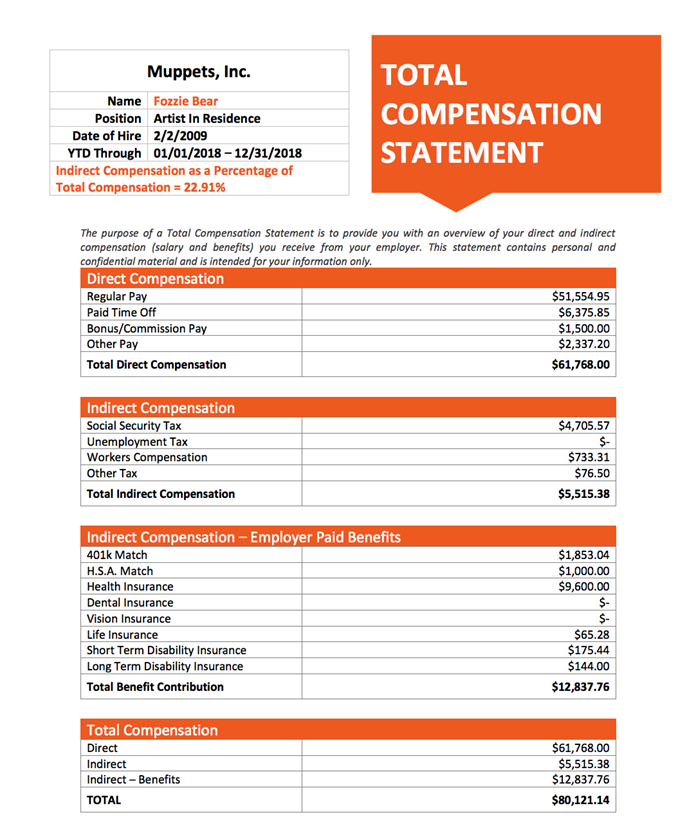A lot more goes into compensation management than just giving your employees some money and hoping they will stay. A well-thought-out strategy can be the difference between a mass exodus and long-term employee retention.
The concept of "total compensation" matters. It is where the real battle is fought for top talent. Your compensation management program will partially determine the strategic goals and objectives your company meets annually. Well-run compensation programs ensure pay equity and equality in benefits throughout the organization. It is important for business owners and HR leaders to know how compensation management works and what employees' expectations are so companies can hit the bull's-eye with their compensation programs.
What is compensation management?
Compensation management is the practice of planning and distributing the overall pay and benefits package to a company's employees. This program ensures that a company's salaries and bonuses remain competitive within the industry and equitable within the organization. It also involves managing company benefit programs and ensuring job classifications are up to date, risks are minimized, and the package meets the overall needs of employees and their families.
A company's compensation program is one of the main reasons employees choose to either remain with an employer or look for a new one.

Even when employees choose to stay, that does not mean they appreciate or fully understand their compensation package. Employers need to make the effort to help employees learn the true value of their overall compensation package.
What are the main types of compensation?
There are four primary types of direct compensation:
- Hourly pay
- Salary
- Commission
- Bonuses
There is also indirect compensation, which includes retirement benefits, health insurance and paid time off. Factoring direct and indirect compensation together helps determine total compensation – the full remuneration a company pays to its employees. [Read related article: What Are Fringe Benefits, and Should You Offer Them?]
In addition to salaries, hourly pay, bonuses and commissions, total compensation includes the value of any benefits employees receive. These are some of the most common attributes within the total compensation spectrum:
- Paid time off (vacation days, sick days and holidays)
- Profit-sharing distributions
- Insurance (medical, dental, disability and life)
- Tuition assistance
- Child care assistance
- Retirement plans
- Employee assistance programs
- Gym memberships
- Relocation expenses
- Learning and development offerings
- Career advancement opportunities
- Stock options
- Other non-cash benefits
While these aren't all the options that can be included in a compensation package, you will likely need to offer at least some of the above perks to keep employees engaged and remain competitive within your industry.
According to a recent study from Jobvite, the most-wanted employee benefits include flextime and remote work opportunities, free food or catered meals, mentoring and development programs, and casual dress codes.
Some employers provide employees with a total compensation report that details all of the compensation they receive. Here's an example of a total compensation statement from Genesis HR Solutions:

How is compensation determined?
HR managers typically use a two-part process to assess employee compensation. The first part is done internally. It includes determining not only what the company should pay, but what it can afford to pay.
The second aspect of this process involves external factors. For example, what do market surveys tell you? What are your competitors paying? How do regional differences in the cost of living impact total compensation? Are there hiring challenges in certain markets?
These are some of the factors in compensation rates:
- Research: Conduct market research inside and outside your industry to gauge what's normal and on trend.
- Competitive strategy: You should offer enough to not just stay on par, but attract top talent away from your competitors.
- Collective company salaries: You'll want to consider your company (and each job level within it) as a whole in your salary strategy. As a general philosophy, you may want to target the 25th percentile within each job category.
- Marketplace drivers: If you're recruiting for employees with hard-to-hire skills, you might need to pay more to get them on your team.

Why is compensation important to HR?
Compensation management plays a significant role in HR, as it directly ties in with employee retention, the hiring and onboarding processes, employee performance, and team engagement throughout the company. Many larger companies have not only HR managers, but also compensation managers to lead this process.
At its heart, compensation is the foundation of employee motivation. So, while HR assists supervisors with behavioral and performance matters, they can also factor employee performance into compensatory decisions.
What is compensation management software?
Compensation management software (whether a stand-alone solution or part of a larger HR software platform) is enterprise software that helps HR curate, manage, calculate and budget for employee salaries. This type of software can benefit businesses of all sizes. The best, most comprehensive compensation software platforms are designed to bring teams closer together and to present information quickly, accurately and cleanly.
Alight notes that compensation management systems tend to be handled by HR teams, but depending on your permissions and security settings, they can be accessible to managers, supervisors or lead workers whenever necessary. Much of the time, compensation management data are accompanied by employee performance data. These combined data sets can help determine promotions, bonuses and annual increases.
These are some of the more popular HR software platforms with compensation management abilities:
| Company | Best for |
| Paychex Flex | Remote teams |
| Rippling | Easy implementation |
| Gusto | Payroll |
| GoCo | Custom workflows |
| BambooHR | Performance management |
- Paychex Flex HR software: Paychex Flex, a full-service payroll and HR software platform that can support businesses of any size, is our best pick for remote teams. Its scalable features can help businesses manage their remote workers and maintain legal compliance. Learn more in our Paychex Flex review.
- Rippling HR software: Rippling is customizable HR software that combines HR and IT automation into one platform. The intuitive software is easy to implement and accessible through a self-service dashboard. With more than 400 integration capabilities, Rippling is easy to incorporate with other business software as well. It helps with HR tasks like onboarding automation, benefits administration, talent management and legal compliance. Find out more in our Rippling HR software review.
- Gusto HR software: Gusto is ideal for employers who want advanced payroll capabilities. Users can onboard new hires, administer employee benefits, track hours and paid time off, run payroll, and automatically file payroll taxes. Read our Gusto HR software review to find out if these robust features are right for your business.
- GoCo HR software: GoCo is comprehensive HR software that allows small businesses to manage and streamline their HR processes. The flexible and user-friendly program is ideal for automating employee hiring and onboarding workflows. To manage employee payroll, businesses can either use GoCo's embedded payroll option, Execupay, or integrate any cloud-based payroll software of their choice. GoCo users can access custom reporting, a self-service dashboard, and supportive customer service. You can learn more in our full review of GoCo.
- BambooHR software: BambooHR is ideal for small businesses wanting a flexible HR software option with great performance management features. You get traditional HR-management features to streamline your internal HR processes, and advanced capabilities like goal tracking and employee assessments can be added separately. Read our BambooHR software review for more information on their features.
Compensation management FAQs
What is a deferred compensation plan?
A deferred compensation plan is an agreement between an employee and employer in which the plan withholds a part of the employee's income until a specific date. The lump sum is then paid out to the employee on that date – this typically falls around the time the employee retires. Some common examples of deferred compensation plans are retirement plans, pensions and stock options.
What regulations affect compensation?
Several regulations affect how you compensate your employees. For example, minimum wage requirements, overtime rates and bonus payments are all regulated. There are also regulations on how many hours certain employees can work, as well as equal pay for equal work. The Fair Labor Standards Act establishes many of these regulations, although there are other federal and state laws to consider as well.
What can HR leaders do to ensure effective compensation management?
Human resources leaders should regularly analyze employee compensation rates for current and future employees to ensure they are abiding by all current federal and state laws, and that the rates they offer are competitive with the industry standard. Performing competitive analyses and offering competitive rates will help attract and retain top talent. HR leaders should also ensure that employees are being paid the correct amount in a timely and reliable manner.
Skye Schooley contributed to the writing and research in this article.


